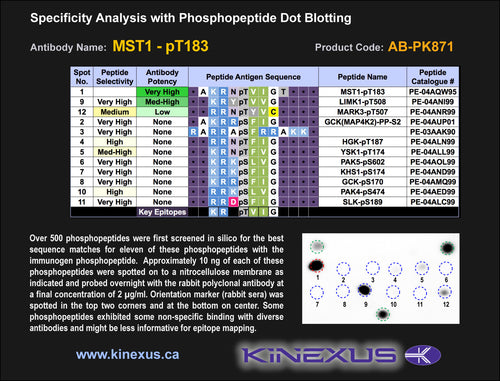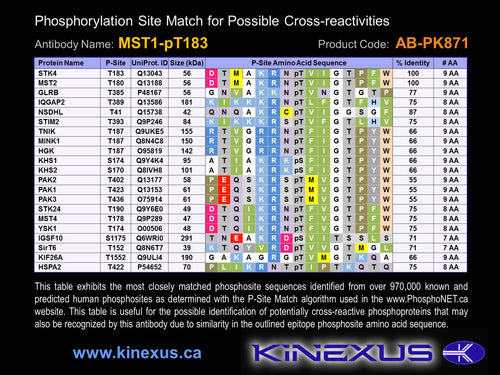Product Name:
MST1-pT183
Product Number:
ab-pk871
Target Full Name: Mammalian STE20-like protein-serine kinase 1 (KRS2); Serine-threonine-protein kinase 4
Target Alias: DKFZp686A2068; Kinase MST1; Kinase responsive to stress 2; KRS2; Krs-2; Mammalian sterile 20-like 1; MST-1; Serine,threonine protein kinase 4; STK4; YSK3; DKFZp686A2068; CCDS13341.1; ENSG00000101109
Product Type Specific: Protein kinase phosphosite-specific antibody
Antibody Code: PK871
Antibody Target Type: Phosphosite-specific
Antibody Phosphosite: T183
Protein UniProt: Q13043
Protein SigNET: Q13043
Antibody Type: Polyclonal
Antibody Host Species: Rabbit
Antibody Immunogen Source: Human MST1 (STK4, Krs2) sequence peptide Cat. No.: PE-04AQW95
Antibody Immunogen Sequence: AKRN(pT)VIGT(bA)C
Antibody Immunogen Description: Corresponds to amino acid residues A179 to T187; In protein kinase catalytic domain activation T-loop between subdomains VII and VIII.
Production Method: Corresponds to amino acid residues A179 to T187; In protein kinase catalytic domain activation T-loop between subdomains VII and VIII.
Antibody Modification: Protein kinase phosphosite-specific antibody
Antibody Concentration: 1 mg/ml
Storage Buffer: Phosphate buffered saline pH 7.4, 0.05% Thimerasol
Storage Conditions: For long term storage, keep frozen at -40°C or lower. Stock solution can be kept at +4°C for more than 3 months. Avoid repeated freeze-thaw cycles.
Product Use: Western blotting | Antibody microarray
Antibody Dilution Recommended: 2 µg/ml for immunoblotting
Antibody Species Reactivity: Human
Antibody Positive Control: The observed molecular mass of the processed target protein on SDS-PAGE gels is reported to be around 53-57 kDa.
Antibody Specificity: Very high
Antibody Cross Reactivity: No significant cross-reactive proteins detected in phenylarsine oxide (PAO)+vanadate-treated HeLa cells, EGF-treated A431 cells and insulin-treated MCF7 cells, when these cells were homogenized in SDS-PAGE sample buffer, although strong background on gels >75 kDa was evident.
Related Product 1: MST1-pT183 blocking peptide
Related Product 2: IRS1 (979-989) KinSub - Insulin receptor substrate 1 (K979-G989, mouse) peptide; Insulin receptor substrate
Related Product 3: MstSubtide - MST1 (STK4) protein kinase substrate peptide
Scientific Background: MST1 (STK4) is a protein-serine/threonine kinase of the STE group and STE20 family. It can induce apoptosis following stress activation. MST1 activity can occur in the nucleus and can be via condensation of chromatin and fragmentation of intranucleosomal DNA. It is activated by caspase-cleavage. Full activation requires homodimerization and autophosphorylation of T183; MST1 phosphotransferase activity can be lost with a T183A mutation. Proteolytic cleavage of MST1 during apoptosis can be reduced with the D326N and D349N mutations. Homodimerization and autophosphorylation are lost with a L444P mutation. It leads to the inactivation of the YAP1 oncoprotein by activating downstream kinases such as LATS1 and LATS2, which phosphorylate YAP1 to prevent it from translocating to the nucleus and transcribing cell proliferation and migration genes. MST1 can also promote apoptosis by preventing the deacetylation of p53/TP53, thus promoting p53-dependent transcription and apoptosis. It is also able to inhibit the PKB/Akt1 pathway. MST1 is linked to pancreatic cancer, which is a rare cancer that does not have characteristic symptoms but is related to the integrated breast cancer and pancreatic cancer pathways.



